The Unitarian Society, East Brunswick, NJ
In the sermon I spent all day writing on Friday and scrapped yesterday, I was going to ask you to cultivate curiosity. But it seemed a little too premature.
Some time in the near future, I will still ask you to be curious. I think I will always ask you to do that – ask that of you and ask that of myself because I understand it to be one of the core qualities of spiritual maturity and spiritual health. But not today. Not mostly.
For some of us it is the exact right time to be asking us to cultivate curiosity, to try to understand how our nation has gotten to this time and this place.
And for others, we must draw a circle that allows for grief to move through us, so that it does not get trapped in the corners and crevices of our souls, becoming rancid and undermining our future engagement in the world.
And for others, we must draw a circle of safety around, assuring those that have been explicitly targeted know that they are not alone in their survival, protecting themselves and their loved ones, their bodies, their minds, their hearts.
Towards this end, as a way to name our experiences and feelings, to help acknowledge them as well as to help them move through our hearts and bodies, there is an activity in the lobby, which will be a rather busy place after the service. There are two larger sheets of paper on the walls on either side of the hallway down to the classrooms. One is a wall of grieving and the other a wall of gratitude. If you have not yet done so already, please write your thoughts/feelings on post-it notes and leave them there. While it is important to give voice to our grief, coupling it with words for our gratitude help us to be grounded and to find balance, enabling us to bring more love to the wider world.
~~~
The second of our faith’s name and namesake – Universalism – comes from the heretical form of Christianity that proclaimed there is no hell and that god is love and only love. Back in its heyday, in the 19th century, there were Universalists who said that all would go to heaven, though some – due to their sins — would be slow to get there. And there were the ultra-Universalists who said that that upon death, every single one of us immediately encountered glory. “Death and Glory!” was their rattling cry.
Today I am wearing not the white pantsuit I ordered online on Tuesday morning – Tuesday morning, friends! A pantsuit that I thought I would be wearing in the pulpit today, an homage not so much to the actual person who was going to be our first woman president, but to the fact of a first woman president and to the long line of woman suffragists who brought this moment to be.
No, I am not wearin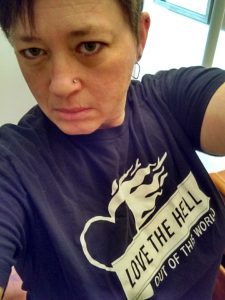 g a white pantsuit. But I am wearing my Universalist t-shirt, the one that says Love the Hell Out of this World. Because I think we are called to do just that, and always have been, but now more than ever.
g a white pantsuit. But I am wearing my Universalist t-shirt, the one that says Love the Hell Out of this World. Because I think we are called to do just that, and always have been, but now more than ever.
Love the hell out of this world.
There will be time to be curious – hell, I am curious now and not just in the condescending way that we UUs can be. I am curious because my heart aches and I’m both not sure how we got here and completely clear how we got here. There will be time to be curious and if you can be compassionately curious right now, already, rock on and praise be. There will be time to be curious, but always, right now, and going forward, we must love the hell out of this world.
I don’t actually believe that god or the nature of the universe is capital L Love. I can’t quite get to the Buddhist point that the nature of the universe is emptiness or neutral either, but I have never gotten fully on the God is Love bandwagon and this means that I am ambivalent about the inspiring refrain: love wins.
Like “Love wins in the end. If love hasn’t won, it’s not the end.”
I think that saying is kinda clever, if a little saccharine. But I don’t really believe it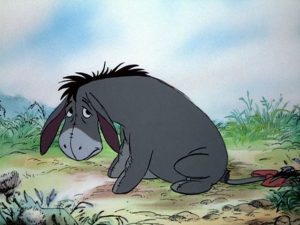 . I want to believe it. But when I am in despair, I definitely don’t believe it. In fact, I have been known to believe the exact opposite. (In my true heart, I am Eeyore.)
. I want to believe it. But when I am in despair, I definitely don’t believe it. In fact, I have been known to believe the exact opposite. (In my true heart, I am Eeyore.)
I’ve kept this information about myself on the down low. Ministers are supposed to be sources of hope, telling their congregation that love trumps hate.
But this week’s truth is much harder to accept. I saw it best expressed in a photo: a woman of color, dejectedly holding a poster that simply said, “Hate won.”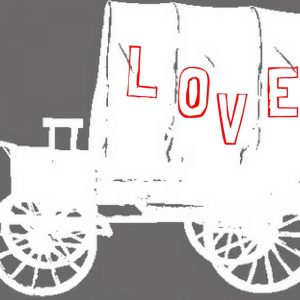
For years, possibly my whole life, I’ve been longing to be on the Love bandwagon one hundred percent, but I’m mostly just chasing it, or watching it go by.
Then yesterday I realized something important: I do believe in love.
I just don’t necessarily believe there is a guarantee it will win out in the end.
You have likely heard the phrase, made famous by Dr. King, of the moral arc of the universe. What does the moral arc of the universe do?
Yes, it bends towards justice.
Some you know that the origin of that phrase is not with Dr. King, but is actually with our own Unitarian ancestor, the 19th century abolitionist and minister Theodore Parker.
I do not believe that love will win on its own. I do not believe that the moral arc of the universe intrinsically bends towards justice.
This is where my humanism comes it: love wins (or doesn’t), the moral arc bends (or doesn’t) because of human co-creation works with other forces, call them divine, call them natural, call them cosmic – to make it thus.
So I don’t actually know if love is going to win. And one day at a time, I don’t care.
I don’t care because I am going to choose love, whether it wins or not. I am going to choose love because without choosing it, I lose my humanity. I am going to choose love – love of my fellow humans, love of protection of those most marginalized, love of this planet — because such acts of integrity not only save my soul, they just might – particularly when part of a collectivity – save the future.
This is why you were greeted this morning with Neighborhood Love Notes – thank you Kathy and Alia. That is love.
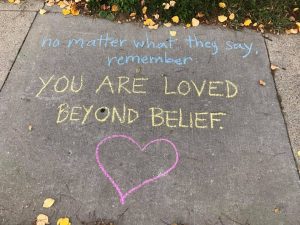 More urgently, that is also why you were given chalk to take home (or to work or your favorite public park), because it is the small acts of love, adding up, over and over, that will save you (and maybe the world). If you didn’t take chalk during the offering, there is still time to change your mind as there is more out in the lobby. When you do write those messages, take photos and post them to the Facebook page for Neighborhood Love Notes. Or send them to me –we’ll make our own TUS album. I’d love to see what you come up with.
More urgently, that is also why you were given chalk to take home (or to work or your favorite public park), because it is the small acts of love, adding up, over and over, that will save you (and maybe the world). If you didn’t take chalk during the offering, there is still time to change your mind as there is more out in the lobby. When you do write those messages, take photos and post them to the Facebook page for Neighborhood Love Notes. Or send them to me –we’ll make our own TUS album. I’d love to see what you come up with.
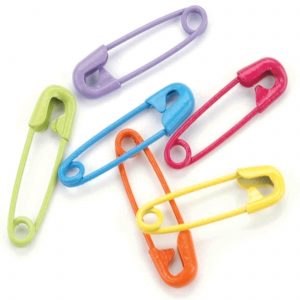 This is why, also in the lobby, we have a bowl of safety pins – thank you Marlene. So that you can show your love to those most marginalized and offer yourself up as part of a circle of protection. This is an American adaptation of something started in the UK after the Brexit vote. There the wearing of the safety pin in a visible way was a sign of safety for any immigrant who felt vulnerable in the midst of the rising xenophobic nationalism entwined in that vote.
This is why, also in the lobby, we have a bowl of safety pins – thank you Marlene. So that you can show your love to those most marginalized and offer yourself up as part of a circle of protection. This is an American adaptation of something started in the UK after the Brexit vote. There the wearing of the safety pin in a visible way was a sign of safety for any immigrant who felt vulnerable in the midst of the rising xenophobic nationalism entwined in that vote.
For us, this safety pin is a sign of safety to all vulnerable populations: queer, trans, and genderqueer peoples; immigrants – people from other nations in this country with or without papers; Muslims and Jews and all folks of persecuted faith traditions; women in hostile environments; Black and Brown folks – bodies and souls – face violence from so many angles it makes my head and heart hurt; people expressing dissent to the rising fascism here in this country.
But wearing the safety pin is not that simple. The person choosing to wear it – adult or child – must be prepared for it to be more than social justice eye candy. It’s not supposed to be the next sexy thing we do to feel good about ourselves, though it is up to us that it not turn out that way.
Wearing it is a responsibility. It is, according to Isobel Debrujah wrote, “a public pledge to be a walking, talking safe space for the marginalized.” It requires that one be willing to act. And if one does not know how to act, then one must commit to learning how to act and to cultivating the courage to act.
What must one learn? How to sit next to someone who is being harassed, letting them know they are not alone and that you won’t leave them alone until you are sure they are safe. How to use a phone’s camera to film a police encounter with a person of color, perhaps downloading the app from the ACLU that transmits the recording directly to them so that if the phone is confiscated or damaged, the recording is still available. How to awkwardly or fiercely interrupt those moments when someone is saying something racist or homophobic or anti-immigrant or able-ist and everyone else is just letting it happen.
If a child or youth wants to wear a safety pin, to be fair to the child who sees it and asks for help in a time of true need, they must learn how and commit to speaking up and seeking adult help when bullying is going on. I hope for our children to be like Anna in the story, who welcomes Farrah and invites her in. Such choices are less likely to happen when fear grows in the air unless our we – we as parents, we as a congregation with our religious education program — explicitly grow these skills in our children, teaching them through our own embodiment of being welcoming and the protective sanctuary we need of each other.
There’s no shame in not yet knowing how to do these things. They take time to learn and practice to get down and courage to attempt. For those of us with identities of privilege (most of us in this room, even if we also have marginalized identities as well), our lives are spent kept away from learning and practicing true acts of solidarity or even seeing the need. Perhaps if there is interest, a workshop on this could be offered and attended.
We are already seeing an upswing in hate crimes, in violence against property and people that is fueled by the hateful rhetoric of our new president-elect, his vice presidential choice, the some of his followers. Wearing a safety pin is not for play. It is not for show. It is for real.
This is why on December 3 at 7pm TUS is showing the film Defying the Nazis: The Sharps’ War and that we are doing it in relationship with interfaith partners. And that we are doing it as a fundraiser for Interfaith RISE which works to settle refugees from all over the world in Central Jersey, providing ongoing supports for their success in their new home.
 With this, we are staking our ground on the side of love. In these new American times that are promising more, not less, hate, we are proclaiming which side we are on. We cannot know which side will win, but we do know that we are choosing the side of love.
With this, we are staking our ground on the side of love. In these new American times that are promising more, not less, hate, we are proclaiming which side we are on. We cannot know which side will win, but we do know that we are choosing the side of love.
This is why I encourage you to learn to tolerate discomfort within yourself in order to cross invisible awkward social boundaries and let people who come from those groups that have been targeted – Muslims, Black people, immigrants, women, queer and trans and genderqueer folks, people who express dissent, people with disabilities – and say explicitly, you have their back. Do this in your neighborhood. Do this at work. You may well get a strange response, or one that tells you not to worry. Do not let that stop you. In my experience, each time I do this, my heart swells with a new boldness that feeds the next time.
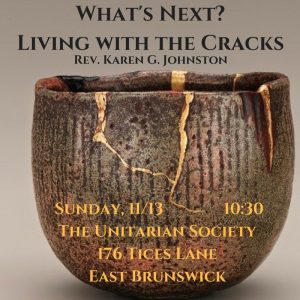 When I first envisioned what I would preach on this Sunday, I imagined using the metaphor of the Japanese art form of kintsugi, wherein cracked pieces of pottery are made more beautiful by being filled with golden resin. I was going to suggest that we can be the golden resin required of us in these times of worsening cracks in our common public life. Hence the title of the sermon that is in your order of service. Well, I mostly left that metaphor in the discarded sermon, so the new title is “Loving the Hell Out of the Cracks in the World.”
When I first envisioned what I would preach on this Sunday, I imagined using the metaphor of the Japanese art form of kintsugi, wherein cracked pieces of pottery are made more beautiful by being filled with golden resin. I was going to suggest that we can be the golden resin required of us in these times of worsening cracks in our common public life. Hence the title of the sermon that is in your order of service. Well, I mostly left that metaphor in the discarded sermon, so the new title is “Loving the Hell Out of the Cracks in the World.”
I have named small acts of love that we can do – small acts of filling the cracked places with something valuable and worthy. I ask you to do them because I think more is going to be asked of us — of all of us. Our practicing these small and ever-increasing-in-size acts of love will make it more possible that the moral arc of the universe will bend towards justice, that love will win out in the end.
There is no way to know if love will win.
I just know that I have picked love’s side…
…win or lose.
In closing, an echo of this morning’s reading:
None of us alone can save the world. Together—that is another possibility waiting. (Rebecca Parker)
Amen. Blessed be.
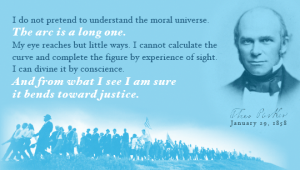
Thank you, miss you, love you.
Bless you.